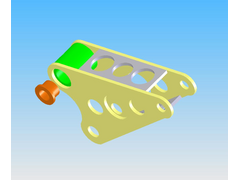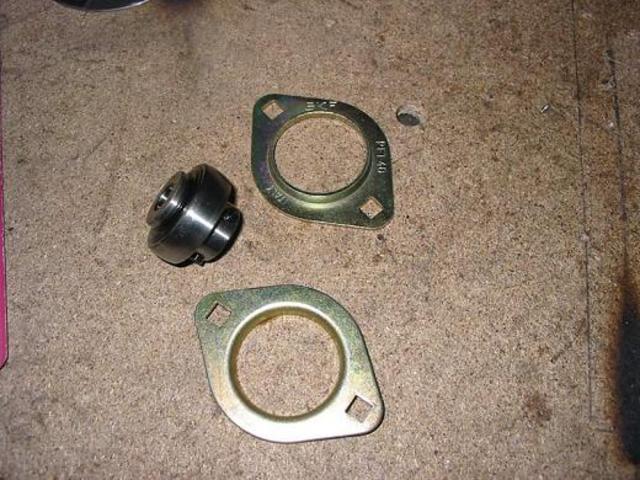There is one either side of my cam.
I have also put a grease nipple in the bush carrier (green bit) to add grease without having to disassemble.


front cam assembly
[Edited on 13/9/2007 by nitram38]

I've got pushrod suspension and run a rocker to connect the pushrod to the shock. At the moment I'm running a poly-bush where the rocker hinges on the body, it all works fine, but I'd rather run a bearing of some sort - any suggestions where I might get such a thing ?
take rocker and bolt to your local bearing supply Company.
Where in West yorks are you ? We have an excelent one in Keighley.
regards
Agriv8
I purchase Bike wheel bearings from Ebay (CBR 600 fronts from memory) for mine. about £10 a pair but you will need to make the housings to suit.
I have used nylon bushes on the F1-2 and I am going to use oilite bearings on the Motaleira.
Either will do on a light car as long as you make the material thick enough
I used ordinary spherical bearings riding on a shaft.
quote:
Originally posted by nitram38
I have used nylon bushes on the F1-2 and I am going to use oilite bearings on the Motaleira.
Either will do on a light car as long as you make the material thick enough
I believe the Striker rocker upgrade uses spherical bearings on a shaft. You could always call Mel at RAW as he's very helpful.
Makes a huge difference as the poly bushed rockers eventually deform and start to bind!
Oilite bearing is brown.
There is one either side of my cam.
I have also put a grease nipple in the bush carrier (green bit) to add grease without having to disassemble.


front cam assembly
[Edited on 13/9/2007 by nitram38]
As I understand it, a rolling bearing must rotate more than the circumference of the rotating elements of the bearing. This is why for small angles of
deflection the tendecy is to use needle rollers, for situations such as little end bearings.
If the ball in a ball race does not rotate more than 360 degrees and travel more than it's circumference, then it wears a local spot in the
race.
So I would think that, sealed for life needle rollers offer the best solution for this application. IMHO.
Ah! So thats why people use needle roller bearings then.
quote:
Originally posted by Confused but excited.
As I understand it, a rolling bearing must rotate more than the circumference of the rotating elements of the bearing. This is why for small angles of deflection the tendecy is to use needle rollers, for situations such as little end bearings.
If the ball in a ball race does not rotate more than 360 degrees and travel more than it's circumference, then it wears a local spot in the race.
So I would think that, sealed for life needle rollers offer the best solution for this application. IMHO.
If you use needle bearings, be aware that if the bearing rotates a very small amount, it's possible that only one bearing is taking the load.
This can result in the race getting a dent in it, since the bearing doesn't move much. Using needle bearings with small diameter bearings can
avoid this.
[edit] "Confused but excited" beat me to it.
[Edited on 9/13/07 by kb58]
Oillite bearings and grease don't mix well --- the idea is the pre-soaked oil is drawn to the bearing surface through the pores in the
bearing.
[Edited on 13/9/07 by britishtrident]
I agree with British trident, I remember boiling oilite bearings in oil to reload them!
Caber
Oilite bearings are used in industries where grease is not allowed such as food production machinery, hence the self lubrication or in locations where
grease would attract dirt.
That is the main reason that grease is not added.
Adding bearing grease is not a problem on my design, whereas a bearing drying out is.
If you use them the manufacturer recommends reboiling them in Sae 30 oil every every 1000 hours or annually unless thay are within oil splash etc.
Additives such as Molybenedium Sulphide should be added if the shaft is hardened or is stainless steel etc.
Putting a grease nipple on ensures quick maintenance so that the bearing does not run dry in the first place.
Here is the answer I recieved from Oilite themselves:
Martin,
If you are using the bearing in a 'dynamic' application whereby a shaft is revolving at speed within the bearing, then an application of
grease between the bearing and shaft will prevent the oil in the bearing from being released into the running clearance. The self lubricating
properties of the bearing are therefore impared.
If the bearing is used to support a hinge pin or similar where there is little or slow movement then there is likely to be no effect.
Regards
Peter Farthing
Quality & Devlopment Manager
In otherwords, for the suspension cam purpose, it will be fine.
[Edited on 14/9/2007 by nitram38]
After much asking around, including a couple of people who've done the job on race-cars. The most common method seems to be
"Y-bearings" produced by SKF
http://www.skf.com/portal/skf/home/products?maincatalogue=1&newlink=6_1_1&lang=en
These are available with mounting flanges idea for mounting in the rocker.
See also http://www.c42.mride.se/pushrod.html
Really? Those are way, way over built. Incredibly heavy for use on a race car. I do see these parts being used, but it's always on heavy machinery, supporting shafts. Never seen one on a race car though.
"Y" bearings are OTT!
I have them on my car but they support my diff:
[img][/img]
Y bearings are mainly for industrial use, also often used in agricultural applications. I have never seen one small and light enough to be considered appropriate for a seven type car, unless you were building with massive over engineering and therefore weight.
They also do them this size. Totally agree that the above bearings are way over engineered. But things come in different sizes folks !


Rescued attachment 156-5671_web_IMG.jpg
But that is not a true Y bearing - it is a bearing and a couple of pieces of pressed steel!!
[Edited on 18/9/07 by andyps]
For what its worth, I'm using a pair of sperical bushings (as in 2 per rocker). I can't help but think things might all go a bit
'wobbly' with just one (push rods and dampers mounted on spericals also).
With 2 you remove the degrees of freedom and can also handle a reasonable amount of axial load (not that there should be any).
How do you guys restrain the needle roller bearings axially?- I have seen people mount them with spacers onto the cage but I didn't like that,
hence the pair of sphericals.
Cheers
quote:
Originally posted by nitram38
Oilite bearing is brown.
There is one either side of my cam.
I have also put a grease nipple in the bush carrier (green bit) to add grease without having to disassemble.
front cam assembly
[Edited on 13/9/2007 by nitram38]
I am using mild steel, as the bush by nature is a bearing.